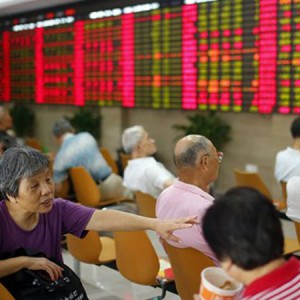Asia stocks sink as Fed hints at stimulus phaseout

BANGKOK — Asian stock markets fell Thursday after the Federal Reserve made it known that its top officials were leaning toward a phaseout of its massive stimulus program.
The Fed released minutes of its July policy meeting Wednesday that showed most members want to slow down the pace of a massive bond-buying program. The U.S. central bank has been purchasing $85 billion of financial assets a month, which was intended to push down interest rates and spur borrowing and growth.
However, U.S. economic data in recent months has been strong enough to stir some Fed officials to call for a winding down of the asset purchases. That has sparked a sell-off in stock markets, which had been pumped up by the low interest rate policy, with some weaker Asian economies such as India and Indonesia particularly hard hit.
Critics have said the program has raised the risk of igniting inflation by pumping up the money supply and also could create asset bubbles in assets such as stocks.
The Fed minutes didn’t indicate when the “tapering” of purchases might begin, leaving analysts to guess.
“Most analysts still expect tapering to start in September, or at the bare minimum a September announcement and implementation through October and November,” said Stan Shamu, market strategist of IG in Melbourne, Australia.
Japan’s Nikkei 225 index fell 0.3 percent to 13,380.28. Hong Kong’s Hang Seng index dropped 0.5 percent to 21,701.22. South Korea’s Kospi lost 0.9 percent to 1,849.39. Australia’s S&P/ASX 200 shed 0.6 percent to 5,068.70.
The benchmark index in the Philippines sank 5.8 percent, catching up with earlier losses in regional markets after being closed due to flooding that submerged large parts of the capital Manila.
Mainland Chinese shares rose after a private manufacturing survey showed growth in factory output in the world’s No. 2 economy. HSBC Corp. said the preliminary version of its monthly purchasing managers’ index for August rose to 50.1 from July’s 47.7. Numbers above 50 indicate an expansion in activity.
The Shanghai Composite Index rose 0.2 percent to 2,077.23. The Shenzhen Composite Index rose 0.4 percent to 1,007.87.
In New York, the Dow Jones industrial average fell for a sixth day in a row, its longest losing streak in more than a year. The index fell 0.7 percent to finish at 14,897.55. The S&P 500 lost 0.6 percent to 1,642.80. The Nasdaq lost 0.4 percent to 3,599.79.
Benchmark oil for October delivery was down 6 cents to $103.79 per barrel in electronic trading on the New York Mercantile Exchange. The contract fell $1.26 to close at $103.85 per barrel on the Nymex on Wednesday.
In currencies, the euro fell to $1.3336 from $1.3342 late Wednesday. The dollar rose to 98.32 yen from 97.76 yen.